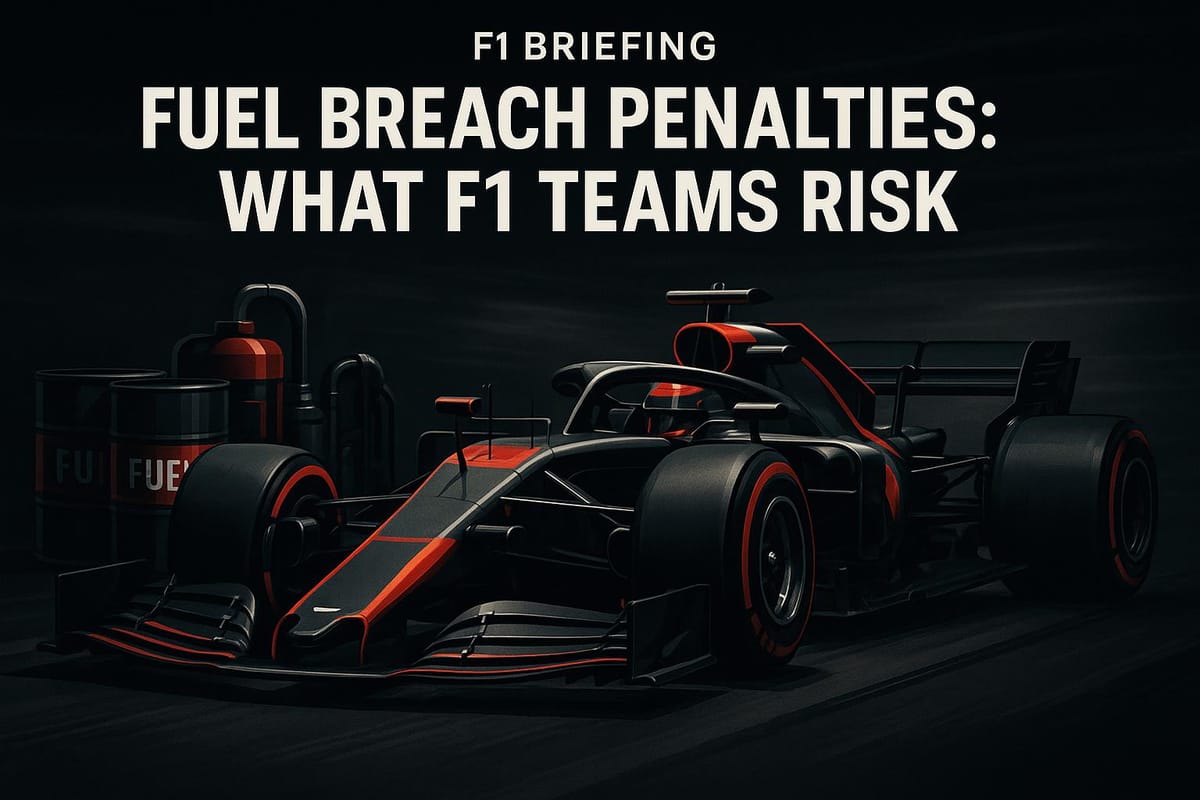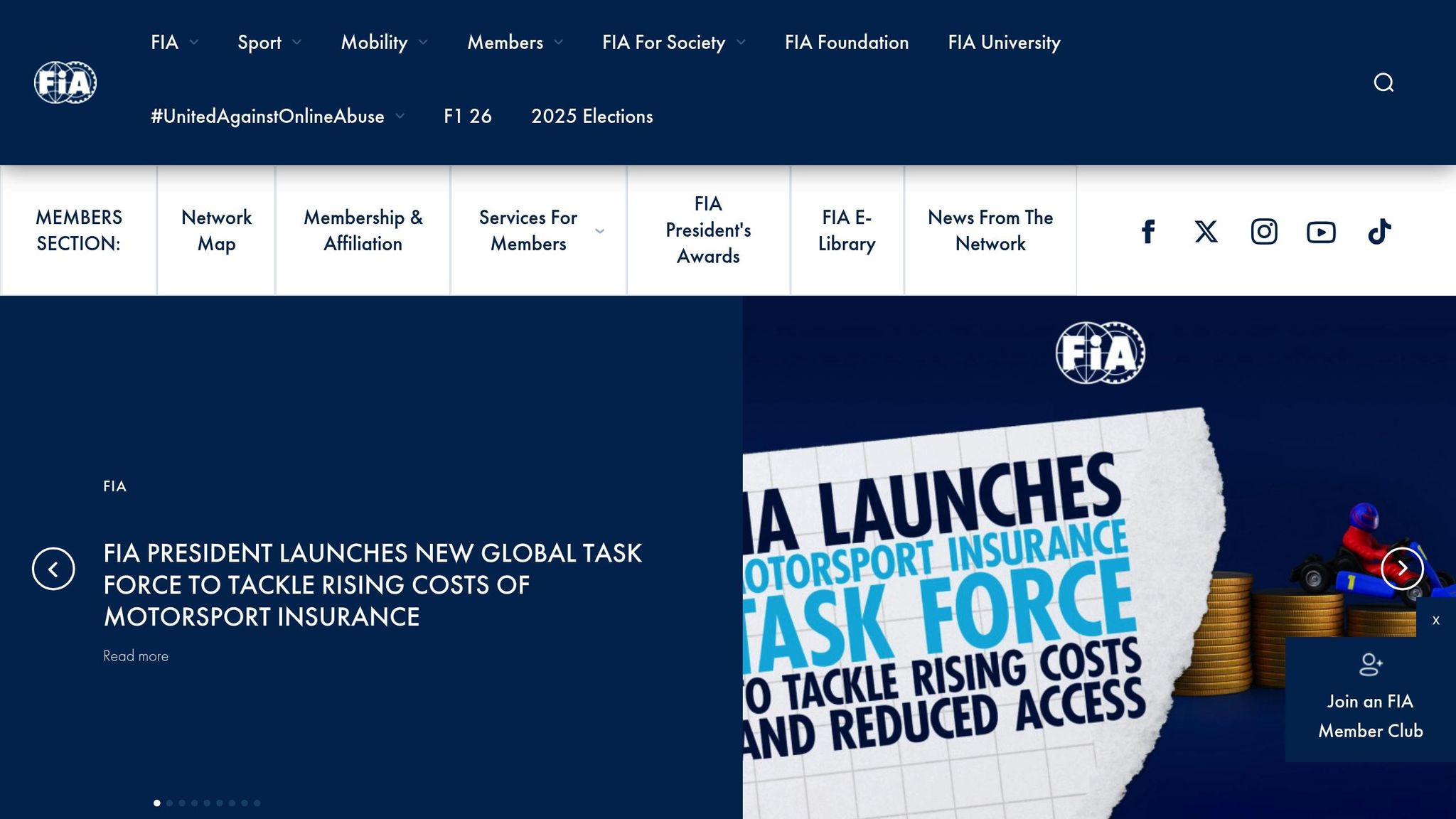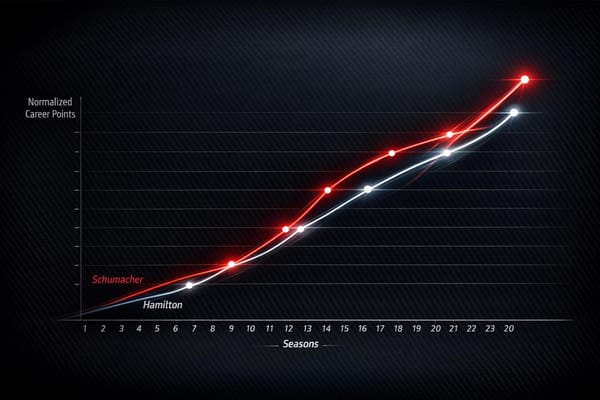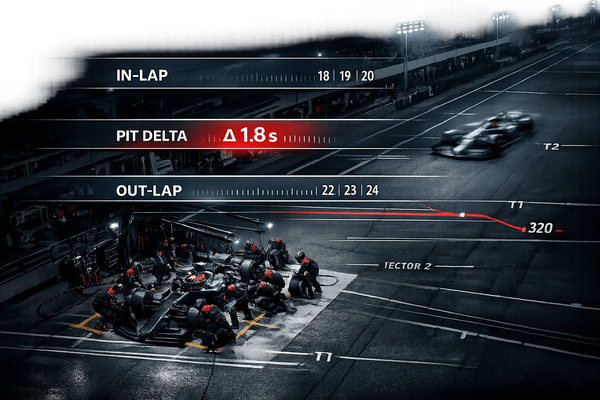Fuel Breach Penalties: What F1 Teams Risk
Fuel breaches in Formula 1 can lead to severe penalties, impacting race results, team finances, and championship standings.

Breaking fuel rules in Formula 1 can cost teams more than just race results. From disqualifications to financial losses, the penalties are severe. The FIA enforces strict standards to ensure fair competition and safety, with consequences that can derail championship hopes.
Key Takeaways:
- Penalties Include: Disqualifications, fines, point deductions, and reduced revenue shares.
- Impact Areas: Race results, team budgets, sponsor relations, and long-term strategies.
- Severity Matters: Minor infractions may result in time penalties, while major breaches can lead to season-altering consequences.
- Financial Strain: Smaller teams feel fines more acutely, creating a disproportionate burden.
Fuel compliance is not just about performance - it's about maintaining integrity on and off the track.
What Happens When F1 Drivers Exceed Fuel Limits? - Pole Position Experts
1. Major Fuel Breach Cases
Fuel breaches in Formula 1 reveal the intense challenges teams face under the sport’s strict regulations. Over the years, several high-profile incidents have underscored the evolving enforcement by the FIA and the serious consequences teams can face when rules are broken.
Penalty Types
The FIA applies a tiered approach to penalize fuel-related violations. Depending on the severity, penalties range from technical warnings and grid penalties to full race disqualifications. Minor infractions might result in time penalties that erase any competitive advantage gained.
These penalties don’t just affect immediate race results - they can also force teams to rethink their long-term strategies.
Severity and Impact
The consequences of fuel breaches often extend beyond a single race. Severe penalties, like disqualifications, can significantly harm a team’s championship standing. When safety concerns are involved - such as those affecting engine performance or driver safety - the FIA tends to respond with stricter scrutiny and harsher punishments.
For teams, this can mean scrambling to adjust strategies or overhauling technical systems to ensure compliance moving forward.
Financial Implications
Fuel breaches don’t just hurt teams on the track; they also come with financial consequences. Teams may face steep fines, lose prize money, and risk damaging relationships with sponsors who expect strong, compliant performance. Additionally, the costs of ensuring ongoing compliance with regulations can add up, further straining budgets.
Championship Consequences
Fuel regulation violations can have a major impact on championship battles, especially during critical points in the season. In the most serious cases, the FIA has imposed additional penalties like championship point deductions or sanctions that carry over to multiple race weekends. These actions are designed to deter teams from intentionally breaking the rules.
Such penalties can dramatically shift standings for both drivers and teams. Over time, the FIA’s handling of these cases has set important precedents, shaping the regulatory framework that governs the sport today.
2. FIA Penalty Framework for Fuel Breaches

The FIA takes fuel regulation breaches seriously, implementing a penalty system that hits teams where it hurts: their wallets and their championship standings. By learning from previous violations, the FIA has crafted strict measures designed to discourage teams from breaking the rules. Here's how these penalties play out.
Financial Implications
Breaking fuel regulations can lead to hefty fines. These financial penalties aren't just a slap on the wrist - they can cause significant monetary losses that ripple through a team's budget, making teams think twice before bending the rules.
Championship Consequences
The fallout for a team’s championship aspirations can be even more punishing. Infractions often lead to disqualifications that not only wipe out race points but also impact season-long standings. On top of that, the FIA can deduct points from both drivers and constructors, which could be the difference between winning and losing a title. In the most extreme cases, a team might face disqualification for the entire season, completely shutting down their championship hopes. These penalties can dramatically shift the balance during tight championship battles, underscoring the high stakes of compliance.
Pros and Cons
The FIA's penalty framework for fuel breaches comes with its share of advantages and challenges. While it aims to uphold fairness and safety, its application can sometimes lead to unintended consequences for teams.
| Pros | Cons |
|---|---|
| Strong deterrent effect – Financial and championship penalties discourage teams from risking violations. | Season-altering consequences – Severe penalties can knock teams out of championship contention, even for minor infractions. |
| Ensures fair competition – All teams must follow the same fuel regulations and safety standards. | Inconsistent enforcement – Penalty severity can vary, creating uncertainty for teams. |
| Levels the playing field – Stops wealthier teams from simply absorbing fines to gain an edge. | Unequal financial burden – Smaller teams feel the impact of fines far more than wealthier teams. |
| Clear guidelines – Teams know the rules and the consequences of breaking them. | No distinction for intent – Accidental errors are penalized just as harshly as deliberate violations. |
| Supports safety – Strict enforcement ensures critical safety measures are upheld. | Impact on championship dynamics – Late-season penalties can disproportionately affect title races. |
One of the framework’s biggest strengths is its ability to deter violations. The threat of stiff penalties pushes teams to prioritize compliance, which has helped keep fuel breaches relatively rare. This commitment to following the rules enhances the sport’s integrity and ensures a level playing field.
That said, the severity of the penalties can sometimes backfire. Even unintentional infractions might carry consequences that dramatically alter championship standings. Timing also plays a big role - an early-season penalty might leave room for recovery, but the same infraction late in the season could derail a team’s title hopes entirely.
Another issue lies in the financial impact. A hefty fine might be a mere inconvenience for a well-funded team, but for smaller teams with tighter budgets, it can be a significant setback. This disparity highlights the uneven playing field when it comes to financial penalties.
Finally, late-season penalties add another layer of complexity, as they can heavily influence championship outcomes. And because the framework doesn’t account for intent, it often treats genuine mistakes as harshly as deliberate rule-breaking, which can feel unfair to those affected.
Conclusion
The FIA's fuel penalty framework plays a key role in maintaining safety, ensuring fair competition, and upholding the integrity of the sport. By enforcing strict fuel regulations - such as the race limit of 100–110 kg (220–242 lb) and a maximum fuel-flow rate of 100 kg/h (220 lb/h) - the system ensures that all teams adhere to the same technical standards. These measures reflect the sport's commitment to consistency and fairness on the track.
FAQs
What are some notable examples of fuel regulation breaches in Formula 1, and how did they affect the teams involved?
Fuel regulation violations in Formula 1 have had far-reaching consequences, impacting teams both competitively and reputationally. A striking case is the 2007 espionage scandal, where sensitive technical data, including fuel-related details, was mishandled. This incident tarnished the reputations of McLaren, Ferrari, and Renault, leading to severe penalties and hefty fines.
Beyond controversies, improper refueling practices have historically led to dangerous pit stop incidents, such as fires, which pushed the sport to implement stricter safety measures. These situations underscore how breaches in fuel regulations can not only disrupt team performance but also threaten driver safety and compromise the integrity of the sport.
How do fuel breach penalties impact smaller F1 teams compared to larger ones?
In Formula 1, fuel breach penalties can have a much heavier impact on smaller teams compared to their wealthier rivals. For a team operating on a budget of around $80 million, even a single fine can take a significant chunk out of their financial resources. This could disrupt their operations or force them to scale back on development efforts to stay afloat.
Meanwhile, larger teams with budgets exceeding $450 million are in a far better position to handle these penalties. For them, fines represent only a small fraction of their overall spending, allowing them to absorb the cost without major consequences.
This financial imbalance means smaller teams often struggle to stay competitive after facing penalties, while bigger teams can continue their season with little to no disruption.
Why doesn’t the FIA treat accidental and deliberate fuel breaches differently when penalizing teams?
The FIA’s penalty system is designed to address the severity and impact of a fuel breach, rather than trying to determine the intent behind it. This approach helps ensure decisions are consistent, especially since proving intent during a race weekend can be nearly impossible.
By focusing on the outcomes of a breach, the FIA works to protect the fairness of the competition and safeguard the sport’s integrity - whether the violation happens by mistake or on purpose.




